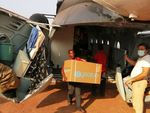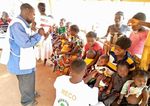UNICEF Central African Republic Flash Update - 8 March 2021
←
→
Page content transcription
If your browser does not render page correctly, please read the page content below
UNICEF Central African Republic
Flash Update – 8 March 2021
Context and humanitarian situation
Despite a decrease in the number of clashes, the security situation in the Central African Republic (CAR) remains tense as
the national army and allied bilateral forces continue to regain control of areas occupied by the Coalition des Patriotes pour
le Changement (CPC) since mid-December. In the past few weeks, military operations primarily concerned the areas of
Bambari and Bossangoa, triggering new waves of displacement. The state of emergency declared on 21 January was
extended for six months and the nationwide curfew is now from 8pm to 5am. With the second round of the legislative
elections scheduled for 14 March and the continuing military operations, the overall situation remains volatile.
OCHA estimates that the current crisis has caused the displacement of 276,000 people and according to UNHCR an
additional 109,000 Central Africans are currently in DRC, Cameroon, Chad and the Republic of Congo due to the
crisis. Although more than half of the displaced are thought to have already returned home, more than 129,000 remain
internally displaced according to OCHA. For fear of further attacks, most of them have sought shelter in in locations they
consider consider safer within the affected towns, such as churches, or have fled to the surrounding bush where they live
in deplorable conditions and generally cannot be accessed.
Given the current violence, protection is one of the most urgent needs of displaced people. Cases of sexual violence against
women and girls and child protection issues such as unaccompanied and separated children and forced recruitment are
being reported. Humanitarian assessments also continue to show that food, primary health care, water and sanitation,
essential household items and shelter are the other most urgent humanitarian needs. Access to aducation is also becoming
an acute problem. In a joint statement realeased on 23 Februar, CAR Humanitarian Coordinator Denise Brown and UNICEF
Representative Fran Equiza alerted that half of the country’s children are currently out of school because of the conflict, 999
schools are non-operational as a result of fighting and 26 are still occupied by armed groups.
Meanwhile, while the movement of trucks between Cameroon and CAR is slowly resuming in escorted convoys, the ongoing
insecurity is still causing major disruptions on the main supply route (MSR1), delaying the timely delivery of essential aid to
affected populations and sustaining increases in the prices of food staples. Adding to the negative socio-economic impact
of COVID-19, this new crisis is further aggravating food insecurity in a country already affected by a high prevalence of
acute malnutrition, which assessments by UNICEF partners show is reaching critical levels among newly displaced children.
Humanitarian access remains a major concern, with 115 incidents against aidworkers (including one death) reconrded by
OCHA in January and February against 46 in 2020 over the same period, sustaining the suspension or reduction of
humanitarian presence in most affecte areas.
UNICEF F response
UNICEF continues to ensure full operational presence in its four field offices of Bouar and Bossangoa, where UNICEF
teams temporarily live in the office due to acute insecurity in these towns, as well as Kaga Bandoro and Bambari.
West
In Bouar, the main city in the West, located on the MSR1, of the 12,000 people who formed internally dispaced people (IDP)
settlements following the 17 January clashes, three quarters have returned home, according to OCHA.
Child Friendly Space in Bouar © UNICEF / C. Betorngaye-Lamane Emergency water distribution in Saint Michel IDP settlement in Bouar
© UNICEF / A. Rama-BessinUNICEF Central African Republic
Flash Update – 8 March 2021
UNICEF partners Action Contre la Faim (ACF) for the Rapid Response Mechanism (RRM) and Agence Nationale de l’Eau
de et l’Assainissement (ANEA) continue to provide safe water for drinking, cooking and personal hygiene for the 2,626 IDP
remaining in Saint Michel and SOS sites. On 20 February, the RRM distributed kits of essential household items each
comprising 2 mosquito nets, 2 plastic mats, 2 blankets, 6 soap bars and 1 jerrycan to 239 IDP housefolds in Saint Michel
site.
Thanks to the medicine kits dispatched immediately after the first clashes, the hospital and the three health centers near
the IDP settlements continue to have the capacity to provide free treatment to displaced and vulnerable people. During the
last week, 228 people, including 110 children under 5, received free essential care. Follow-up screening of Severe Acute
Malnutrition (SAM) cases is ongoing, and 96 additional children have been treated. As is in most places affected by the
current crisis, gender-based violence (GBV) has been a major issue in Bouar, where UNICEF partners have recorded and
supported 99 survivors since mid-January.
UNICEF has been working with local authorities to promote the reopening of schools, which started on 15 February and is
supporting partners to enable effective resumption of classes. With the continuing insecurity this is a slow process, ans and
UNICEF estimates that only about 15 per cent of the children in Bouar area are back in school.
Taking advantage of improved access on the Bangui-Boali-Bossambele section of the MSR1, RRM partner ACF was able
to conduct a multisectoral assessment. The results show worrying levels of vulnerability in all sectors as large numbers of
families, who had been forced to flee in December, are gradually returning to their looted homes. Levels of destruction in
schools and health faiclitiues are also high. Most water points have been damaged and the diarrhea rate is around 40%
among children under five. The RRM is coordinating with other
actoris to jointly assist up to 25,000 people. UNICEF also
supported MSF with essential drugs for the treatment of IDPs
returning from the bush in Bossembele area.
As government and and allied forces advanced towards
Bossangoa, a major town in the Northwest which was
eventually reclaimed from the CPC on 24 February, an
estimated 14,000 people, mostly schildren, fled to the
town’s churches and a similar number to the bush according
to local sources. Tensions in town remain high and no return
movements are currently taking place. UNICEF partner CODIS
is contributing to the provision of free essential care for the
IDPs in town, mostly ensured by MSF. CODIS already referred
12 survivors of sexual violence for medical care. Awareness
raising actions on the prevention and protection of children
against violence, including sexual exploitation and abuse and
the monitoring of separated children were immediately set up
Due to insecurity, airfreight is currently the only way to deliver aid but given the impact of the crisis on children, UNICEF is
supplies to Bossangoa © UNICEF / F. Kashando working to scale-up its protection response.
Centre
In Dekoa, a town 260km North of Bangui, UNICEF
continues to deliver assistance in health, nutrition and
child protection. UNICEF partner Médecins d’Afrique
(MDA) ensures free primary care at the hospital as well as
SAM screening and treatment. In February 1,775 children
were screened and 39 treated.
UNICEF RRM partner Solidarités Internations conducted a
mulisector assessment on the road leading West from
Dekoa in 3 villages where 176 displaced households have
been identified and will shorlty receive assistance in
esssential household items and access to water.
Nutritional screening in Dekoa © MDAUNICEF Central African Republic Flash Update – 8 March 2021 In Grimari, after the clashes of 12-15 January that broke out simultaneously along the Grimari-Bambari and Grimari- Kouango roads, 300 additional displaced families arrived in late February following new clashes. As access is now improving, RRM partners ACTED is conducting a new multisector assessment in the area. On 15 February, the town of Bambari experienced heavy gunfire lasting several hours, after which government and allied forces regained control of the town, occupied by the CPC since 14 December. Several civilians were injure according to local sources, and several hundred families sought refuge in the IDP site near the hospital. Between 17 and 19 February, some of the them returned to their home, while other families remain displaced in the bush and in Elevage IDP site. UNICEF participated in a joint inter-agency assessment and immedialtely launched a child protection. Four unaccompanied and separated children were identified and reunited. Children directly affected by conflict and displacement are also receiving psychological support. East In the Northern surroundings of Bangassou, the main town in Eastern CAR, RRM partner ACTED started the distribution of essential household items for more than 12,500 displaced children and their fanmilies. A multisector assessment is expected to be launched further North towards Bakouma as soon as security conditions allows. UNICEF partner MDA is still providing free essential care for children and pregnant women in the Cesacoba and Siwa IDP settlements.1,125 children aged 6 to 59 months were screened, 252 MAM and 87 SAM children have been immediately treated. Funding In 2021, UNICEF Humanitarian Action for Children (HAC) appeal currently amounts to US$75.7 million for CAR. It reflects the deterioration in the situation of children and growing humanitarian needs (including COVID-19 related), even before the ongoing new crisis. To date, the HAC is 27% funded, when including 2021 contributions and funds carried over from 2020. Funding gap for the treatment of severe acute malnutrition (SAM) is currently particularly critical. As of 8 March, in 2021, funding against the HAC was received from Denmark; the United Kingdom (FCDO); Japan; the United States of America (USAID/BHA and USAID/FFP); Switzerland; and UNICEF’s Global Humanitarian Thematic Funds. UNICEF Representative Fran Equiza visiting a Child A family returning from displacement in the bush receives Friendly Space in Bouar © UNICEF / C. Betorngaye- free medical care from MSF in Bossembele area © MSF Lamane
UNICEF Central African Republic
Flash Update – 8 March 2021
UNICEF CAR: www.unicef.org/infobycountry/CAR.html
UNICEF CAR Facebook: www.facebook.com/UNICEFCAR
UNICEF CAR Twitter: https://twitter.com/UNICEFCAR
UNICEF CAR Humanitarian Action for Children Appeal: http://www.unicef.org/appeals/car.htm
Who to contact for Fran Equiza Paolo Marchi Olivier Corbet
further information: Representative Deputy Representative Chief Emergency & Field Operations
Central African Republic Central African Republic Central African Republic
Tel: +236 7055 0205 Tel: +236 7055 0206 Tel: +236 7007 5710
Email: fequiza@unicef.org Email: pmarchi@unicef.org Email: ocorbet@unicef.orgYou can also read























































